Edie Melson's Blog, page 350
March 2, 2016
Idea Starters for Writers: Calendar Days—March's Crazy Holidays & Special Occasions
by Edie Melson @EdieMelson
 March is here and it’s time again for Calendar Days. These are just fun to read.
March is here and it’s time again for Calendar Days. These are just fun to read.
They’re also a great way to jumpstart our creativity when looking for ideas for articles and blog posts. They’re also a fun writing prompt idea. In addition, calendar days are great conversation starters for social media sites like Facebook and Twitter, especially when two contrasting holidays fall on the same date.
Here are some that tickled my funny bone this month:
March 6: I don't think it's a coincidence that it's Dentist Day and White Chocolate Cheesecake Day.March 9: It seems a little unfeeling that it's Panic Day and Get Over it Day. Just Sayin'. March 15: Is it Dumbstruck Day because it's Everything You Think is Wrong Day or it's True Confessions Day. March 18: It's Forgive Mom and Dad Day and Supreme Sacrifice Day—OUCH!
March Holidays, Special Days & Downright Crazy Days
March is:Irish American MonthCredit Education MonthMusic in Our Schools MonthCaffeine Awareness MonthNational Peanut MonthNational Nutrition MonthNational Craft MonthRed Cross MonthUmbrella MonthInternational Ideas MonthCheerleading Safety MonthNational Women’s History Month
Weekly CelebrationsWeek 2:National Bubble WeekCrochet Week
Daily CelebrationsMarch 1Fruit Compote DayNational Pig DayPlan a Solo Vacation DayPeanut Butter Lovers DayWorld Compliment DayHorse Protection Day
March 2Dr. Seuss DayBanana Cream Pie DayOld Stuff Day
March 3Cold Cuts DayWorld Book DayPeach Blossom DayNational Anthem DayI Want You to be Happy DayWhat if Cats & Dogs Had Opposable Thumbs Day
March 4Pound Cake DayDress in Blue DayToy Soldier DayHug a GI DaySalesperson DayGrammar DayEmployee Appreciation DayInternational Scrapbooking Industry DayDay of Unplugging
March 5Cheese Doodle DayAbsinthe DayMultiple Personality Day
March 6National Frozen Food DayNamesake DayDentist DayWhite Chocolate Cheesecake Day
March 7Cereal DayCrown Roast of Pork DayBe Heard DayFun Facts about Names Day
March 8Proof Reading DayOrganize Your Home Office DayUnique Names DayBe Nasty DayPeanut Cluster DayInternational (Working) Woman’s Day
March 9False Teeth DayRegistered Dietitian DayPanic DayBarbie DayNo Smoking DayGet Over It DayCrabmeat Day
March 10Day of AwesomenessName Tag DayPack Your Lunch DayPopcorn Lover’s DayWorld Kidney DayMario Day
March 11Middle Name Pride DayWorld Plumbing DayOatmeal Nut Waffles Day
March 12Girl Scout DayPlant a Flower DayGenealogy Day
March 13Ken DayOpen an Umbrella Indoors DayCoconut Torte DayCheck Your Batteries DayEarmuffs Day
March 14Napping DayInternational Ask a Question DayLearn about Butterflies DayFill Our Staplers DayMoth–er Day (Moth, like the bug)National Potato Chip DayDribble to Work DayNational Pi Day (because today is 3.14 – the value of Pi)
March 15Buzzards DayDumbstruck DayEverything You Think is Wrong DayBrutus DayIdes of MarchTrue Confessions Day
March 16Lips Appreciation DayFreedom of Information Day
March 17Submarine DaySaint Patrick’s Day
March 18Awkward Moments DayNational Agriculture DayForgive Mom and Dad DaySupreme Sacrifice DayBiodiesel Day
March 19Chocolate Caramel DayClient’s DayPoultry DayCorndog Day
March 20International Day of HappinessKiss Your Fiancé DayInternational Earth DayExtraterrestrial Abductions DayProposal DayNational Quilting DayWon’t You Be My Neightbor DayRavioli DaySnowman Burning DayWorld Storytelling Day
March 21Memory DaySingle Parent’s DayCredit Card Reduction DayFragrance DayWorld Down Syndrome DayCommon Courtesy DayFrench Bread Day
March 22World Water DayAs Young as You Feel DayNational Goof Off Day
March 23National Chip and Dip DayNear Miss DayPuppy DayMelba Toast Day
March 24Tuberculosis DayChocolate Covered Raisins Day
March 25Waffle DayGood FridayTolkien Reading DayPecan DayWaffle Day
March 26Nougat DayNational Spinach DayLegal Assistance DayMake Up Your Own Holiday DayPurple Day
March 27EasterSpanish Paella DayNeighbor DayQuirky Country Music Song Titles Day
March 28Something on a Stick DayBlack Forest Cake DayWeed Appreciation Day
March 29Smoke and Mirrors DayNiagara Falls runs Dry DayNational Mom and Pop Business Owners DayLemon Chiffon Cake Day
March 30Take a Walk in the Park DayNational Doctors DayManatee Appreciation DayI am in Control DayPencil Day
March 31World Backup DayBunsen Burner DayCrayola Crayon DayEiffel Tower Day
Now let's do a little brainstorming for next month. What are some of your favorite days from the list and how do you propose using them?
Don't forget to join the conversation!Blessings,Edie
TWEETABLESNeed an original article or #blog post - Calendar Days is the answer - @EdieMelson (Click to Tweet)
Looking for a unique#socialmedia update? Calendar Days on @EdieMelson (Click to Tweet)
 March is here and it’s time again for Calendar Days. These are just fun to read.
March is here and it’s time again for Calendar Days. These are just fun to read. They’re also a great way to jumpstart our creativity when looking for ideas for articles and blog posts. They’re also a fun writing prompt idea. In addition, calendar days are great conversation starters for social media sites like Facebook and Twitter, especially when two contrasting holidays fall on the same date.
Here are some that tickled my funny bone this month:
March 6: I don't think it's a coincidence that it's Dentist Day and White Chocolate Cheesecake Day.March 9: It seems a little unfeeling that it's Panic Day and Get Over it Day. Just Sayin'. March 15: Is it Dumbstruck Day because it's Everything You Think is Wrong Day or it's True Confessions Day. March 18: It's Forgive Mom and Dad Day and Supreme Sacrifice Day—OUCH!
March Holidays, Special Days & Downright Crazy Days
March is:Irish American MonthCredit Education MonthMusic in Our Schools MonthCaffeine Awareness MonthNational Peanut MonthNational Nutrition MonthNational Craft MonthRed Cross MonthUmbrella MonthInternational Ideas MonthCheerleading Safety MonthNational Women’s History Month
Weekly CelebrationsWeek 2:National Bubble WeekCrochet Week
Daily CelebrationsMarch 1Fruit Compote DayNational Pig DayPlan a Solo Vacation DayPeanut Butter Lovers DayWorld Compliment DayHorse Protection Day
March 2Dr. Seuss DayBanana Cream Pie DayOld Stuff Day
March 3Cold Cuts DayWorld Book DayPeach Blossom DayNational Anthem DayI Want You to be Happy DayWhat if Cats & Dogs Had Opposable Thumbs Day
March 4Pound Cake DayDress in Blue DayToy Soldier DayHug a GI DaySalesperson DayGrammar DayEmployee Appreciation DayInternational Scrapbooking Industry DayDay of Unplugging
March 5Cheese Doodle DayAbsinthe DayMultiple Personality Day
March 6National Frozen Food DayNamesake DayDentist DayWhite Chocolate Cheesecake Day
March 7Cereal DayCrown Roast of Pork DayBe Heard DayFun Facts about Names Day
March 8Proof Reading DayOrganize Your Home Office DayUnique Names DayBe Nasty DayPeanut Cluster DayInternational (Working) Woman’s Day
March 9False Teeth DayRegistered Dietitian DayPanic DayBarbie DayNo Smoking DayGet Over It DayCrabmeat Day
March 10Day of AwesomenessName Tag DayPack Your Lunch DayPopcorn Lover’s DayWorld Kidney DayMario Day
March 11Middle Name Pride DayWorld Plumbing DayOatmeal Nut Waffles Day
March 12Girl Scout DayPlant a Flower DayGenealogy Day
March 13Ken DayOpen an Umbrella Indoors DayCoconut Torte DayCheck Your Batteries DayEarmuffs Day
March 14Napping DayInternational Ask a Question DayLearn about Butterflies DayFill Our Staplers DayMoth–er Day (Moth, like the bug)National Potato Chip DayDribble to Work DayNational Pi Day (because today is 3.14 – the value of Pi)
March 15Buzzards DayDumbstruck DayEverything You Think is Wrong DayBrutus DayIdes of MarchTrue Confessions Day
March 16Lips Appreciation DayFreedom of Information Day
March 17Submarine DaySaint Patrick’s Day
March 18Awkward Moments DayNational Agriculture DayForgive Mom and Dad DaySupreme Sacrifice DayBiodiesel Day
March 19Chocolate Caramel DayClient’s DayPoultry DayCorndog Day
March 20International Day of HappinessKiss Your Fiancé DayInternational Earth DayExtraterrestrial Abductions DayProposal DayNational Quilting DayWon’t You Be My Neightbor DayRavioli DaySnowman Burning DayWorld Storytelling Day
March 21Memory DaySingle Parent’s DayCredit Card Reduction DayFragrance DayWorld Down Syndrome DayCommon Courtesy DayFrench Bread Day
March 22World Water DayAs Young as You Feel DayNational Goof Off Day
March 23National Chip and Dip DayNear Miss DayPuppy DayMelba Toast Day
March 24Tuberculosis DayChocolate Covered Raisins Day
March 25Waffle DayGood FridayTolkien Reading DayPecan DayWaffle Day
March 26Nougat DayNational Spinach DayLegal Assistance DayMake Up Your Own Holiday DayPurple Day
March 27EasterSpanish Paella DayNeighbor DayQuirky Country Music Song Titles Day
March 28Something on a Stick DayBlack Forest Cake DayWeed Appreciation Day
March 29Smoke and Mirrors DayNiagara Falls runs Dry DayNational Mom and Pop Business Owners DayLemon Chiffon Cake Day
March 30Take a Walk in the Park DayNational Doctors DayManatee Appreciation DayI am in Control DayPencil Day
March 31World Backup DayBunsen Burner DayCrayola Crayon DayEiffel Tower Day
Now let's do a little brainstorming for next month. What are some of your favorite days from the list and how do you propose using them?
Don't forget to join the conversation!Blessings,Edie
TWEETABLESNeed an original article or #blog post - Calendar Days is the answer - @EdieMelson (Click to Tweet)
Looking for a unique#socialmedia update? Calendar Days on @EdieMelson (Click to Tweet)
Published on March 02, 2016 01:00
March 1, 2016
How to Install Click to Tweet on Your Blog
by Edie Melson @EdieMelson
 Today I'm stepping way outside my comfort zone. Instead of my usual written post, I've put together a screencast.
Today I'm stepping way outside my comfort zone. Instead of my usual written post, I've put together a screencast.
I've chosen a screencast because I know many people get frustrated with written directions—even when pictures are included. Let's face it, we all learn differently.
I'd love to know if you found the screencast helpful, or if you'd like for me to stick with written posts. Neither opinion will hurt my feelings. I really want to present valuable information in a way that helps you all the most.
So without further dithering, here we go!
How to Install a
Click to Tweet on Your Blog
TWEETABLES
How to Install Click to Tweet on Your Blog (a screencast) - @EdieMelson (Click to Tweet)
Get more #socialmedia shares for your blog with a Click to Tweet in each post - @EdieMelson (Click to Tweet)
 Today I'm stepping way outside my comfort zone. Instead of my usual written post, I've put together a screencast.
Today I'm stepping way outside my comfort zone. Instead of my usual written post, I've put together a screencast. I've chosen a screencast because I know many people get frustrated with written directions—even when pictures are included. Let's face it, we all learn differently.
I'd love to know if you found the screencast helpful, or if you'd like for me to stick with written posts. Neither opinion will hurt my feelings. I really want to present valuable information in a way that helps you all the most.
So without further dithering, here we go!
How to Install a
Click to Tweet on Your Blog
TWEETABLES
How to Install Click to Tweet on Your Blog (a screencast) - @EdieMelson (Click to Tweet)
Get more #socialmedia shares for your blog with a Click to Tweet in each post - @EdieMelson (Click to Tweet)
Published on March 01, 2016 01:00
February 29, 2016
Carolina Christian Writers Conference
Edie here. We're ramping up into writing conference season. I've already attended two this year as part of the faculty—Asheville Christian Writers Conference and Florida Christian Writers Conference. I'll be part of another one in a couple of weeks, the Carolina Christian Writers Conference. Linda Gilden is the director and a good friend. Today I persuaded her to give us a preview of what to expect!
Carolina Christian Writers Conference
by Linda Gilden @LindaGilden
 Do you have an idea for a book and have no clue where to start? Have you always wanted to write a book and can’t find anyone to show you how? Are you an expert in your field and would love to share that expertise through articles? Has the publishing world always seemed like a mystery? Or are you looking for a publisher for a completed manuscript?
Do you have an idea for a book and have no clue where to start? Have you always wanted to write a book and can’t find anyone to show you how? Are you an expert in your field and would love to share that expertise through articles? Has the publishing world always seemed like a mystery? Or are you looking for a publisher for a completed manuscript?
If you are struggling to find a way to get a writing career off the ground, look no more! The place for you is the Carolina Christian Writers Conference. March 11-12, 2016, at the Hangar of Spartanburg, SC’s First Baptist Church, professional writers, editors, agents, and publishers will be waiting to answer all your questions and more.
Carolina Christian Writers Conference will once again help new writers get started on their journeys, give established writers new opportunities for publication, and show advanced writers the next step for progress.
 Bob Hostetler
Bob Hostetler
 Dawn Smith JordanKeynote speaker this year will be Bob Hostetler. Dawn Smith Jordan, author and former Miss South Carolina, will lead worship. Joining them will be representatives from AMG Publishers, Ambassador International, Broad Street Publishers, CBN.com, EA Book Publishing, JourneyForth Publishers, Lighthouse Publishing of the Carolinas, Mollie Green Magazine, New Hope Publishers, Whoa! Magazine, and more. Professional writers Candy Arrington, Lisa Carter, Cheri Cowell, Michelle Cox, Edna Ellison, Jimmie Davis, Linda Gilden, Larry Leech II, Edie Melson, and Karen Whiting will be there to encourage you and give you tips as to how to move your writing along to the next level. They have been where you are and would love to help you. Agent Les Stobbe will give you advice as to how your writing fits into the big picture of publishing. Nancy Lohr, Sam and Tim Lowry, Beth Patch, Gloria Penwell, Cindy Sproles complete the faculty.
Dawn Smith JordanKeynote speaker this year will be Bob Hostetler. Dawn Smith Jordan, author and former Miss South Carolina, will lead worship. Joining them will be representatives from AMG Publishers, Ambassador International, Broad Street Publishers, CBN.com, EA Book Publishing, JourneyForth Publishers, Lighthouse Publishing of the Carolinas, Mollie Green Magazine, New Hope Publishers, Whoa! Magazine, and more. Professional writers Candy Arrington, Lisa Carter, Cheri Cowell, Michelle Cox, Edna Ellison, Jimmie Davis, Linda Gilden, Larry Leech II, Edie Melson, and Karen Whiting will be there to encourage you and give you tips as to how to move your writing along to the next level. They have been where you are and would love to help you. Agent Les Stobbe will give you advice as to how your writing fits into the big picture of publishing. Nancy Lohr, Sam and Tim Lowry, Beth Patch, Gloria Penwell, Cindy Sproles complete the faculty.
If you have never attended a writers conference, don’t wait another minute. There is no better vehicle for encouragement, inspiration, networking, learning, and opportunities to pitch your work. There will also be an optional Friday morning session called “Your Book Doctor.,” which will give you an opportunity to work on your own book idea, proposal, or manuscript to ready it for an editor’s eye.
Full information is on the website at www.fbs.org/writers. You can register today. Don’t let this opportunity go by to start your writing career or take your career to the next level. There is room for you! Sign up today and bring a friend.
TWEETABLEDo you have an idea for a book & no clue where to start? @LindaGilden (Click to Tweet)
Carolina Christian Writers Conference - take action for your #writing dreams - @LindaGilden (Click to Tweet)
 Linda Gilden is a wife, mother, and grandmother. She finds great joy (and excellent writing material) in time spent with her family. Helping writers understand PSL is one of the things she also loves to do through her newest book, Called to Write. This month she is excited about having a chance to set new goals for the new year and maybe even do a few more rewrites!
Linda Gilden is a wife, mother, and grandmother. She finds great joy (and excellent writing material) in time spent with her family. Helping writers understand PSL is one of the things she also loves to do through her newest book, Called to Write. This month she is excited about having a chance to set new goals for the new year and maybe even do a few more rewrites!
To find out more about Linda, her writing, and her ministry, visit www.lindagilden.com . You can also connect with her on Twitter @LindaGilden and Facebook at Author Linda Gilden.
Carolina Christian Writers Conference
by Linda Gilden @LindaGilden
 Do you have an idea for a book and have no clue where to start? Have you always wanted to write a book and can’t find anyone to show you how? Are you an expert in your field and would love to share that expertise through articles? Has the publishing world always seemed like a mystery? Or are you looking for a publisher for a completed manuscript?
Do you have an idea for a book and have no clue where to start? Have you always wanted to write a book and can’t find anyone to show you how? Are you an expert in your field and would love to share that expertise through articles? Has the publishing world always seemed like a mystery? Or are you looking for a publisher for a completed manuscript?If you are struggling to find a way to get a writing career off the ground, look no more! The place for you is the Carolina Christian Writers Conference. March 11-12, 2016, at the Hangar of Spartanburg, SC’s First Baptist Church, professional writers, editors, agents, and publishers will be waiting to answer all your questions and more.
Carolina Christian Writers Conference will once again help new writers get started on their journeys, give established writers new opportunities for publication, and show advanced writers the next step for progress.
 Bob Hostetler
Bob Hostetler
 Dawn Smith JordanKeynote speaker this year will be Bob Hostetler. Dawn Smith Jordan, author and former Miss South Carolina, will lead worship. Joining them will be representatives from AMG Publishers, Ambassador International, Broad Street Publishers, CBN.com, EA Book Publishing, JourneyForth Publishers, Lighthouse Publishing of the Carolinas, Mollie Green Magazine, New Hope Publishers, Whoa! Magazine, and more. Professional writers Candy Arrington, Lisa Carter, Cheri Cowell, Michelle Cox, Edna Ellison, Jimmie Davis, Linda Gilden, Larry Leech II, Edie Melson, and Karen Whiting will be there to encourage you and give you tips as to how to move your writing along to the next level. They have been where you are and would love to help you. Agent Les Stobbe will give you advice as to how your writing fits into the big picture of publishing. Nancy Lohr, Sam and Tim Lowry, Beth Patch, Gloria Penwell, Cindy Sproles complete the faculty.
Dawn Smith JordanKeynote speaker this year will be Bob Hostetler. Dawn Smith Jordan, author and former Miss South Carolina, will lead worship. Joining them will be representatives from AMG Publishers, Ambassador International, Broad Street Publishers, CBN.com, EA Book Publishing, JourneyForth Publishers, Lighthouse Publishing of the Carolinas, Mollie Green Magazine, New Hope Publishers, Whoa! Magazine, and more. Professional writers Candy Arrington, Lisa Carter, Cheri Cowell, Michelle Cox, Edna Ellison, Jimmie Davis, Linda Gilden, Larry Leech II, Edie Melson, and Karen Whiting will be there to encourage you and give you tips as to how to move your writing along to the next level. They have been where you are and would love to help you. Agent Les Stobbe will give you advice as to how your writing fits into the big picture of publishing. Nancy Lohr, Sam and Tim Lowry, Beth Patch, Gloria Penwell, Cindy Sproles complete the faculty.If you have never attended a writers conference, don’t wait another minute. There is no better vehicle for encouragement, inspiration, networking, learning, and opportunities to pitch your work. There will also be an optional Friday morning session called “Your Book Doctor.,” which will give you an opportunity to work on your own book idea, proposal, or manuscript to ready it for an editor’s eye.
Full information is on the website at www.fbs.org/writers. You can register today. Don’t let this opportunity go by to start your writing career or take your career to the next level. There is room for you! Sign up today and bring a friend.
TWEETABLEDo you have an idea for a book & no clue where to start? @LindaGilden (Click to Tweet)
Carolina Christian Writers Conference - take action for your #writing dreams - @LindaGilden (Click to Tweet)
 Linda Gilden is a wife, mother, and grandmother. She finds great joy (and excellent writing material) in time spent with her family. Helping writers understand PSL is one of the things she also loves to do through her newest book, Called to Write. This month she is excited about having a chance to set new goals for the new year and maybe even do a few more rewrites!
Linda Gilden is a wife, mother, and grandmother. She finds great joy (and excellent writing material) in time spent with her family. Helping writers understand PSL is one of the things she also loves to do through her newest book, Called to Write. This month she is excited about having a chance to set new goals for the new year and maybe even do a few more rewrites!To find out more about Linda, her writing, and her ministry, visit www.lindagilden.com . You can also connect with her on Twitter @LindaGilden and Facebook at Author Linda Gilden.
Published on February 29, 2016 01:00
February 28, 2016
My Platform, My Audience, My Influence
by LaTan Murphy @LaTanM
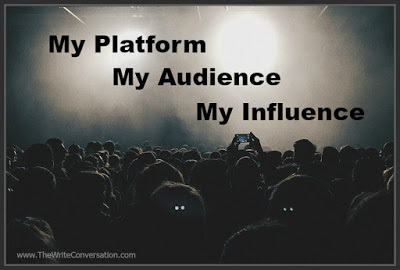 Someone once said, "He who writes to please himself, caters to a fool."
Someone once said, "He who writes to please himself, caters to a fool."
What truth this bears.
Our words-whether written, or spoken, are not to be kept to ourselves for narcissistic tickling of our own ears.
They are God-inspired, for the purpose of blessing others with the rich, powerful influence entrusted to us.Establishing a platform is something every writer must pursue. Drawing an audience is key in creating visibility, influence, and recognition. We live in a noisy world where there is much talk about: OURSELVES. Oh, it's easy to be VISIBLE—even an obnoxious person is most definitely VISIBLE, because an obnoxious person demands attention. Your platform offers a special realm of influence with profound accessibility for captivating the audience you are targeting. Little by little, as you establish your platform your opportunity to influence the lives of many will grow richer, deeper. No one can bring your unique, wealth of wisdom to the world quite like you can. This kind of influence is much more important than being obnoxiously VISIBLE.
 As a speaker and writer, one of the most valuable lessons I have learned is: To never become so pleased with myself that I forget the goal of pleasing my readers and audiences. Although my stories are important and meaningful to me, I must find a way to relay rich messages that benefit others through them.
As a speaker and writer, one of the most valuable lessons I have learned is: To never become so pleased with myself that I forget the goal of pleasing my readers and audiences. Although my stories are important and meaningful to me, I must find a way to relay rich messages that benefit others through them.
As you prepare yourself to write, or speak to your audience, ask yourself this very important question: How can I string my words together in such a way they touch my audience deeply, meeting the "felt-needs" of others. Can readers/listeners relate to my message?
 Perhaps, you write fiction and feel this point doesn't really apply to you. Trust me, it does apply. The most powerful books ever written, the most influential speeches ever spoken, were written and orated by this genius approach: Meeting "felt needs" in order to touch lives deeply.
Perhaps, you write fiction and feel this point doesn't really apply to you. Trust me, it does apply. The most powerful books ever written, the most influential speeches ever spoken, were written and orated by this genius approach: Meeting "felt needs" in order to touch lives deeply.
Remember: Our audience wants to experience fruitful "take-aways." Your audience should leave better than they came to your event, your website, your social media sites. What is the drawing force for my audience/readers? You may not know all the answers, but with research and study-time you will be able to bring quality to those following you.
Think about: What ideas, motivation, direction, solutions do I offer, or can I offer, with additional research? Using this approach will help you influence others at the highest level possible.
As a writer, we must study human nature in order to produce work that inspires, changes, transforms the world around us. Anything less than this becomes self-centered glory.
Today, I'd like to challenge you to pay attention to the world around you. Ask yourself: "What do I bring to the table of life that has power to nourish souls?"
Your greatest platform will build itself as you think in an "others-minded" way. I challenge you to write and/or speak to your audience from this perspective.
If your goal is to be "funny" - you must write about comical things that make people laugh. If your goal is to help men learn how to be better husbands, then you must write what you have learned from your own life-experiences or observations of others. Always write with an outward approach; your words are for others, not to be kept to yourself. Your writing and speaking goals should remain centered around meeting the "felt-needs" of your audience.
Watch and Learn:Linger over the people you influence (your audience) taking careful note of what they respond to.Think about how your own world collides with your audience.Offer relatable life-experiences.Write three topics you could write, or speak about.Based on these experiences, what can you share that will change your followers lives for the better?Practice writing speaking material by thinking introspectively - putting yourself inside of your audiences heads: how might your audience think, feel, react to the world you are creating.
Ask Yourself:"Do I speak from within my readers and from within my audience"?
The Result:Powerful, influential, relatable words flowing fluidly, effectively.
May your platform, your audience, and your influence be blessed territories as you dedicate yourself to these simple principles .
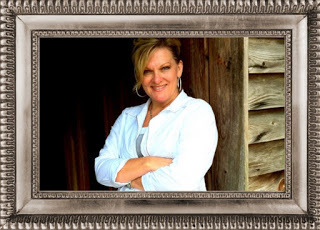 LaTan Murphy
LaTan Murphy
Visit LaTan at:www.latanmurphy.comTwitter: @LaTanM
LinkedIn: LaTan Roland Murphy Facebook: LaTan Murphy
 Someone once said, "He who writes to please himself, caters to a fool."
Someone once said, "He who writes to please himself, caters to a fool." What truth this bears.
Our words-whether written, or spoken, are not to be kept to ourselves for narcissistic tickling of our own ears.
They are God-inspired, for the purpose of blessing others with the rich, powerful influence entrusted to us.Establishing a platform is something every writer must pursue. Drawing an audience is key in creating visibility, influence, and recognition. We live in a noisy world where there is much talk about: OURSELVES. Oh, it's easy to be VISIBLE—even an obnoxious person is most definitely VISIBLE, because an obnoxious person demands attention. Your platform offers a special realm of influence with profound accessibility for captivating the audience you are targeting. Little by little, as you establish your platform your opportunity to influence the lives of many will grow richer, deeper. No one can bring your unique, wealth of wisdom to the world quite like you can. This kind of influence is much more important than being obnoxiously VISIBLE.
 As a speaker and writer, one of the most valuable lessons I have learned is: To never become so pleased with myself that I forget the goal of pleasing my readers and audiences. Although my stories are important and meaningful to me, I must find a way to relay rich messages that benefit others through them.
As a speaker and writer, one of the most valuable lessons I have learned is: To never become so pleased with myself that I forget the goal of pleasing my readers and audiences. Although my stories are important and meaningful to me, I must find a way to relay rich messages that benefit others through them.As you prepare yourself to write, or speak to your audience, ask yourself this very important question: How can I string my words together in such a way they touch my audience deeply, meeting the "felt-needs" of others. Can readers/listeners relate to my message?
 Perhaps, you write fiction and feel this point doesn't really apply to you. Trust me, it does apply. The most powerful books ever written, the most influential speeches ever spoken, were written and orated by this genius approach: Meeting "felt needs" in order to touch lives deeply.
Perhaps, you write fiction and feel this point doesn't really apply to you. Trust me, it does apply. The most powerful books ever written, the most influential speeches ever spoken, were written and orated by this genius approach: Meeting "felt needs" in order to touch lives deeply. Remember: Our audience wants to experience fruitful "take-aways." Your audience should leave better than they came to your event, your website, your social media sites. What is the drawing force for my audience/readers? You may not know all the answers, but with research and study-time you will be able to bring quality to those following you.
Think about: What ideas, motivation, direction, solutions do I offer, or can I offer, with additional research? Using this approach will help you influence others at the highest level possible.
As a writer, we must study human nature in order to produce work that inspires, changes, transforms the world around us. Anything less than this becomes self-centered glory.
Today, I'd like to challenge you to pay attention to the world around you. Ask yourself: "What do I bring to the table of life that has power to nourish souls?"
Your greatest platform will build itself as you think in an "others-minded" way. I challenge you to write and/or speak to your audience from this perspective.
If your goal is to be "funny" - you must write about comical things that make people laugh. If your goal is to help men learn how to be better husbands, then you must write what you have learned from your own life-experiences or observations of others. Always write with an outward approach; your words are for others, not to be kept to yourself. Your writing and speaking goals should remain centered around meeting the "felt-needs" of your audience.
Watch and Learn:Linger over the people you influence (your audience) taking careful note of what they respond to.Think about how your own world collides with your audience.Offer relatable life-experiences.Write three topics you could write, or speak about.Based on these experiences, what can you share that will change your followers lives for the better?Practice writing speaking material by thinking introspectively - putting yourself inside of your audiences heads: how might your audience think, feel, react to the world you are creating.
Ask Yourself:"Do I speak from within my readers and from within my audience"?
The Result:Powerful, influential, relatable words flowing fluidly, effectively.
May your platform, your audience, and your influence be blessed territories as you dedicate yourself to these simple principles .
 LaTan Murphy
LaTan Murphy
Visit LaTan at:www.latanmurphy.comTwitter: @LaTanM
LinkedIn: LaTan Roland Murphy Facebook: LaTan Murphy
Published on February 28, 2016 01:00
February 27, 2016
A Writer Wanders...
by Edie Melson @EdieMelson
 "A writer wanders. And a once-lost story finds a home." ~Robert Benson
"A writer wanders. And a once-lost story finds a home." ~Robert Benson
This week, I've had the incredible experience of listening to author Robert Benson. He's been the keynote speaker at the Florida Christian Writers Conference where I'm also on faulty. This particular quote resonated with me, and I thought I wanted to share it with you.
I also invite you to use this image any way you like online. Post it to your blog, share it on Facebook, Twitter, Pinterest, anywhere you'd like. All I ask is that you keep it intact, with my website watermark visible.
Don't forget to join the conversation!Blessings,Edie
TWEETABLE
"A writer wanders. And a once-lost story finds a home." Robert Benson (Click to Tweet)
 "A writer wanders. And a once-lost story finds a home." ~Robert Benson
"A writer wanders. And a once-lost story finds a home." ~Robert BensonThis week, I've had the incredible experience of listening to author Robert Benson. He's been the keynote speaker at the Florida Christian Writers Conference where I'm also on faulty. This particular quote resonated with me, and I thought I wanted to share it with you.
I also invite you to use this image any way you like online. Post it to your blog, share it on Facebook, Twitter, Pinterest, anywhere you'd like. All I ask is that you keep it intact, with my website watermark visible.
Don't forget to join the conversation!Blessings,Edie
TWEETABLE
"A writer wanders. And a once-lost story finds a home." Robert Benson (Click to Tweet)
Published on February 27, 2016 01:00
February 26, 2016
Portly Prose – Does Your Writing Need a Diet?
by Lori Hatcher @LoriHatcher2
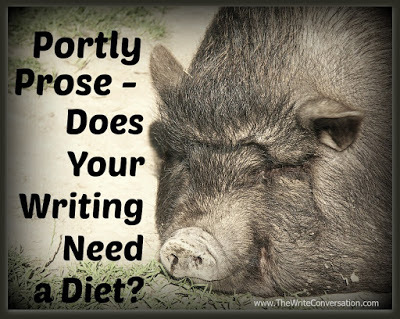 When you face a writing assignment with a word count of 250, do you clap or groan? For me, writing with a short word count is much more challenging than writing with a long one.
When you face a writing assignment with a word count of 250, do you clap or groan? For me, writing with a short word count is much more challenging than writing with a long one.
For several years the editor of a popular anthology invited me to submit 225-word devotions for her consideration. “Two hundred and twenty-five words?” I’d say. “I can’t even build a porch with fewer than 225 words, and you want me to build a whole house?” Crafting a devotion with a hook, scriptural insight, personal application, and conclusion in only a few hundred words seemed impossible.But I took the challenge. My first attempt tipped the word count scales at an obese 350. I tossed out one of my favorite illustrations. That shaved off 50 words. I reworked the conclusion. Down 25 more. I briefly considered cutting the Scripture verse, but realized that would defeat the whole purpose. My moment of insanity, however, revealed to me how attached I had become to my well-turned phrases. Cut my words or God’s Word? Uh . . . why am I even asking this question?
As I examined my dumpy devotion looking for traces of literary cellulite, I was surprised at what I found. Muffin top metaphors. Saggy similies. Portly prose. Roly-poly rhetoric. Chubby conclusions. My devotion, I discovered, needed much more than a nip and tuck. It needed gastric bypass.
Here are five tips I applied to trim the fat from my writing: 5 tips to trim the fat from my writing.Focus on one main idea. Think snapshot, not panorama. Throw out anything that doesn’t directly support your main point.Choose one verse, the strongest one that supports your premise. Resist the urge to throw the whole Book at your readers.Eliminate wordy, conversational phrases. (“In my opinion,” “It appears to me,” and “It’s come to my attention,” are common examples.) These add unnecessary inches to your writing waistline and make your work bulge.Substitute strong verbs for adipose adjectives. If you carefully select your verbs, you won’t need most adjectives. (“Jean silently and slowly walked toward John,” becomes “Jean crept toward John,” saving you three precious words.)Cut most uses of the word “that.”Read the sentence aloud. If it makes sense without “that,” you know the word is dead weight. “To” is also often extraneous. (“Lord, help me to pray more,” becomes, “Lord, help me pray more.”)
5 tips to trim the fat from my writing.Focus on one main idea. Think snapshot, not panorama. Throw out anything that doesn’t directly support your main point.Choose one verse, the strongest one that supports your premise. Resist the urge to throw the whole Book at your readers.Eliminate wordy, conversational phrases. (“In my opinion,” “It appears to me,” and “It’s come to my attention,” are common examples.) These add unnecessary inches to your writing waistline and make your work bulge.Substitute strong verbs for adipose adjectives. If you carefully select your verbs, you won’t need most adjectives. (“Jean silently and slowly walked toward John,” becomes “Jean crept toward John,” saving you three precious words.)Cut most uses of the word “that.”Read the sentence aloud. If it makes sense without “that,” you know the word is dead weight. “To” is also often extraneous. (“Lord, help me to pray more,” becomes, “Lord, help me pray more.”)
These tips will help you tone and tighten your prose, whether you’re squeezing your thoughts into a Size 2(00) devotion or donning a billowy 3XXX teaching piece. Just like wriggling into jeans two sizes too small, writing tightly will be painful at first. But unlike those too-tight jeans that hinder your movement, cut off your blood flow, and make you grumpy, changing saggy writing to svelte will force you to write better, think more creatively, and feel more confident about your writing.
Now, if you’re up to the challenge of writing a 200-400-word devotion, check out these fine publications:
Christian Devotions (300-400 words)
Light From the Word (200-400 words)
The Secret Place (100-200 words)
The Upper Room Devotional(~250 words)
TWEETABLESPortly Prose - Does Your #Writing Need a Diet? @LoriHatcher2 on @EdieMelson (Clic to Tweet)
5 Tips to trim the fat from your #writing - @LoriHatcher2 on @EdieMelson (Click to Tweet)
 Lori Hatcher is the editor of Reach Out, Columbia magazine and the author of two devotional books. Her second book, Hungry for God…Starving for Time, 5-Minute Devotions for Busy Women released in December. A blogger, writing instructor, and women’s ministry speaker, her goal is to help women connect with God in the craziness of life. You’ll find her pondering the marvelous and the mundane on her blog, Hungry for God…Starving for Time. Connect with her on Facebook, Twitter (@LoriHatcher2), or Pinterest (Hungry for God).
Lori Hatcher is the editor of Reach Out, Columbia magazine and the author of two devotional books. Her second book, Hungry for God…Starving for Time, 5-Minute Devotions for Busy Women released in December. A blogger, writing instructor, and women’s ministry speaker, her goal is to help women connect with God in the craziness of life. You’ll find her pondering the marvelous and the mundane on her blog, Hungry for God…Starving for Time. Connect with her on Facebook, Twitter (@LoriHatcher2), or Pinterest (Hungry for God).
 When you face a writing assignment with a word count of 250, do you clap or groan? For me, writing with a short word count is much more challenging than writing with a long one.
When you face a writing assignment with a word count of 250, do you clap or groan? For me, writing with a short word count is much more challenging than writing with a long one.For several years the editor of a popular anthology invited me to submit 225-word devotions for her consideration. “Two hundred and twenty-five words?” I’d say. “I can’t even build a porch with fewer than 225 words, and you want me to build a whole house?” Crafting a devotion with a hook, scriptural insight, personal application, and conclusion in only a few hundred words seemed impossible.But I took the challenge. My first attempt tipped the word count scales at an obese 350. I tossed out one of my favorite illustrations. That shaved off 50 words. I reworked the conclusion. Down 25 more. I briefly considered cutting the Scripture verse, but realized that would defeat the whole purpose. My moment of insanity, however, revealed to me how attached I had become to my well-turned phrases. Cut my words or God’s Word? Uh . . . why am I even asking this question?
As I examined my dumpy devotion looking for traces of literary cellulite, I was surprised at what I found. Muffin top metaphors. Saggy similies. Portly prose. Roly-poly rhetoric. Chubby conclusions. My devotion, I discovered, needed much more than a nip and tuck. It needed gastric bypass.
Here are five tips I applied to trim the fat from my writing:
 5 tips to trim the fat from my writing.Focus on one main idea. Think snapshot, not panorama. Throw out anything that doesn’t directly support your main point.Choose one verse, the strongest one that supports your premise. Resist the urge to throw the whole Book at your readers.Eliminate wordy, conversational phrases. (“In my opinion,” “It appears to me,” and “It’s come to my attention,” are common examples.) These add unnecessary inches to your writing waistline and make your work bulge.Substitute strong verbs for adipose adjectives. If you carefully select your verbs, you won’t need most adjectives. (“Jean silently and slowly walked toward John,” becomes “Jean crept toward John,” saving you three precious words.)Cut most uses of the word “that.”Read the sentence aloud. If it makes sense without “that,” you know the word is dead weight. “To” is also often extraneous. (“Lord, help me to pray more,” becomes, “Lord, help me pray more.”)
5 tips to trim the fat from my writing.Focus on one main idea. Think snapshot, not panorama. Throw out anything that doesn’t directly support your main point.Choose one verse, the strongest one that supports your premise. Resist the urge to throw the whole Book at your readers.Eliminate wordy, conversational phrases. (“In my opinion,” “It appears to me,” and “It’s come to my attention,” are common examples.) These add unnecessary inches to your writing waistline and make your work bulge.Substitute strong verbs for adipose adjectives. If you carefully select your verbs, you won’t need most adjectives. (“Jean silently and slowly walked toward John,” becomes “Jean crept toward John,” saving you three precious words.)Cut most uses of the word “that.”Read the sentence aloud. If it makes sense without “that,” you know the word is dead weight. “To” is also often extraneous. (“Lord, help me to pray more,” becomes, “Lord, help me pray more.”)These tips will help you tone and tighten your prose, whether you’re squeezing your thoughts into a Size 2(00) devotion or donning a billowy 3XXX teaching piece. Just like wriggling into jeans two sizes too small, writing tightly will be painful at first. But unlike those too-tight jeans that hinder your movement, cut off your blood flow, and make you grumpy, changing saggy writing to svelte will force you to write better, think more creatively, and feel more confident about your writing.
Now, if you’re up to the challenge of writing a 200-400-word devotion, check out these fine publications:
Christian Devotions (300-400 words)
Light From the Word (200-400 words)
The Secret Place (100-200 words)
The Upper Room Devotional(~250 words)
TWEETABLESPortly Prose - Does Your #Writing Need a Diet? @LoriHatcher2 on @EdieMelson (Clic to Tweet)
5 Tips to trim the fat from your #writing - @LoriHatcher2 on @EdieMelson (Click to Tweet)
 Lori Hatcher is the editor of Reach Out, Columbia magazine and the author of two devotional books. Her second book, Hungry for God…Starving for Time, 5-Minute Devotions for Busy Women released in December. A blogger, writing instructor, and women’s ministry speaker, her goal is to help women connect with God in the craziness of life. You’ll find her pondering the marvelous and the mundane on her blog, Hungry for God…Starving for Time. Connect with her on Facebook, Twitter (@LoriHatcher2), or Pinterest (Hungry for God).
Lori Hatcher is the editor of Reach Out, Columbia magazine and the author of two devotional books. Her second book, Hungry for God…Starving for Time, 5-Minute Devotions for Busy Women released in December. A blogger, writing instructor, and women’s ministry speaker, her goal is to help women connect with God in the craziness of life. You’ll find her pondering the marvelous and the mundane on her blog, Hungry for God…Starving for Time. Connect with her on Facebook, Twitter (@LoriHatcher2), or Pinterest (Hungry for God).
Published on February 26, 2016 01:00
February 25, 2016
Are My Stories Autobiographical?
by Henry McLaughlin @RiverBendSagas
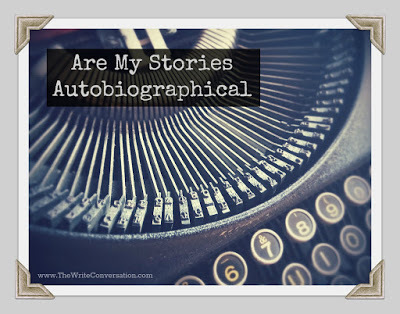 I’ve been asked this question on several occasions. For many authors, their stories, especially their first ones, are indeed autobiographical.
I’ve been asked this question on several occasions. For many authors, their stories, especially their first ones, are indeed autobiographical.
So I pondered this question and compared myself to the hero of my first novel, Michael Archer. Michael used to drink, so we have that in common.
But Michael lied, cheated, stole, assaulted and may have killed in his past. Some of that applied to me but not all of it.
I could see parts of me in Michael and in the other characters in the book. And my life experiences influenced the story. So did my research.But in no way is Journey to Riverbend as the story of my life.
 On the other hand, one of my other stories (unpublished so far), about a man who helps his son deal with the sudden disappearance of the son’s wife, is very personal. For the longest time I could not identify why.
On the other hand, one of my other stories (unpublished so far), about a man who helps his son deal with the sudden disappearance of the son’s wife, is very personal. For the longest time I could not identify why.
The writing of the story flowed smoothly. Characters came to life and shared their stories. Settings had a realism that enhanced the characters and the plot. The twists and turns came at the right times and with the right tension and emotion. Several re-writes improved it immensely.
The problem came when I had to read it aloud at critique groups or when I read chunks of it to my self in the editing process. I couldn’t read without choking up and fighting tears. In groups, others would have to take over the reading.
I struggled and prayed, asking God why this story, of all my stories, affected me this intensely.
Finally, the answer came. The reason this story slams me the way it does, and the reason I had to write it, is I had never finished the grieving process over the loss of our son over twenty years ago. I thought I had. But this story digs deeper into my heart than any other and shows the wounds and hurts I’d never dealt with.
This story completed God’s healing process for me.
In this sense, it is the most autobiographical of my stories because it reveals more of me than any other.
How about you? How autobiographical are your stories?
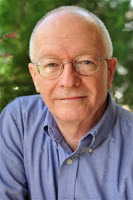 Henry’s debut novel, Journey to Riverbend, won the 2009 Operation First Novel contest.
Henry’s debut novel, Journey to Riverbend, won the 2009 Operation First Novel contest.
He serves as Associate Director of North Texas Christian Writers.
Henry edits novels, leads critique groups, and teaches at conferences and workshops. He enjoys mentoring and coaching individual writers.
Connect with Henry on his blog, Twitter and Facebook.
 I’ve been asked this question on several occasions. For many authors, their stories, especially their first ones, are indeed autobiographical.
I’ve been asked this question on several occasions. For many authors, their stories, especially their first ones, are indeed autobiographical.So I pondered this question and compared myself to the hero of my first novel, Michael Archer. Michael used to drink, so we have that in common.
But Michael lied, cheated, stole, assaulted and may have killed in his past. Some of that applied to me but not all of it.
I could see parts of me in Michael and in the other characters in the book. And my life experiences influenced the story. So did my research.But in no way is Journey to Riverbend as the story of my life.
 On the other hand, one of my other stories (unpublished so far), about a man who helps his son deal with the sudden disappearance of the son’s wife, is very personal. For the longest time I could not identify why.
On the other hand, one of my other stories (unpublished so far), about a man who helps his son deal with the sudden disappearance of the son’s wife, is very personal. For the longest time I could not identify why. The writing of the story flowed smoothly. Characters came to life and shared their stories. Settings had a realism that enhanced the characters and the plot. The twists and turns came at the right times and with the right tension and emotion. Several re-writes improved it immensely.
The problem came when I had to read it aloud at critique groups or when I read chunks of it to my self in the editing process. I couldn’t read without choking up and fighting tears. In groups, others would have to take over the reading.
I struggled and prayed, asking God why this story, of all my stories, affected me this intensely.
Finally, the answer came. The reason this story slams me the way it does, and the reason I had to write it, is I had never finished the grieving process over the loss of our son over twenty years ago. I thought I had. But this story digs deeper into my heart than any other and shows the wounds and hurts I’d never dealt with.
This story completed God’s healing process for me.
In this sense, it is the most autobiographical of my stories because it reveals more of me than any other.
How about you? How autobiographical are your stories?
 Henry’s debut novel, Journey to Riverbend, won the 2009 Operation First Novel contest.
Henry’s debut novel, Journey to Riverbend, won the 2009 Operation First Novel contest. He serves as Associate Director of North Texas Christian Writers.
Henry edits novels, leads critique groups, and teaches at conferences and workshops. He enjoys mentoring and coaching individual writers.
Connect with Henry on his blog, Twitter and Facebook.
Published on February 25, 2016 01:00
February 24, 2016
The Best Tool for Writers—Tenacity
By DiAnn Mills @DiAnnMills
 Be tenacious!How vested are you in your writing goals?
Be tenacious!How vested are you in your writing goals?
Some writers view their work as a hobby. If it works and they sell, great. If the market rejects their writing, no problem. Nothing’s vested for them. They can always try something new.
Some writers are afraid to grasp onto their dreams. They are commonly referred to as closet-writers. If they fail, they haven’t lost anything. Or have they?
Other writers are doggedly determined to publish. Doesn’t matter how long it takes to learn the craft. Doesn’t matter how many rejections. Doesn’t matter how many rewrites. Doesn’t matter the intricate nuances of marketing and promotion. They are persistent. Just try to tell them they don’t have what it takes to succeed, and their tenacity raises another notch. Those are my kind of writers. Because I’m one of them.
I believe the cost of doing everything to reach writing goals far outweighs the cost of doing nothing. Failure is not an option.
Below is a acronym for tenacity.
Take a look. Can you incorporate these tips into your writing life?
 Where is your thick skin?T is for Thick Skin. A writer needs rhino skin to survive the publishing world. We must learn the craft, a continuing process. We toughen up to accept constructive criticism and move forward to write a quality story that honors God and entertains the reader.
Where is your thick skin?T is for Thick Skin. A writer needs rhino skin to survive the publishing world. We must learn the craft, a continuing process. We toughen up to accept constructive criticism and move forward to write a quality story that honors God and entertains the reader.
E is for Entertain. Whether plot driven or character driven, story’s foremost purpose is to entertain the reader with unforgettable characters and a unique plot. Stretch yourself to create a memorable experience.
N is for Never Give Up. When a critique points out flaws and weaknesses in our manuscript; or when a friend or family member believes you’re wasting your time; or when an agent or editor rejects a manuscript; it’s easy to walk away. But a successful writer never gives up. I treasure Winston Churchill’s statement, “Never, never, never give up.” I also value his quote, “If you’re going through hell, keep going.” In fact, that is how we writers often feel when we’re struggling with our stories.
A is for Active. An active writer understands her career is not spent behind a desk. She becomes involved in a writer’s group and attends writer conferences. Networking within the industry is necessary for professional contacts and friendships. An active writer keeps her body in shape. An unhealthy body means an unhealthy mind, and that means creativity crashes.
C is for Characters. Characters are the lifeblood of a novel. Their roles live in the hearts of our readers. We have a responsibility to fully develop our characters physically, spiritually, emotionally, and mentally. Characters reveal themselves in every aspect of our novels, so the reader never forgets them.
I is for Inspire. One of our goals is to inspire readers to grow and change, and become better people. We accomplish this by showing a character who walked through fire and survived. We want readers to be inspired by our stories and discover ways for them to live triumphantly
 You can do it!T is for Truth. Story is a vehicle to show truth. It’s revealed in our premise and theme, surfacing in our protagonists attitudes and motivation. God
You can do it!T is for Truth. Story is a vehicle to show truth. It’s revealed in our premise and theme, surfacing in our protagonists attitudes and motivation. God
may not be mentioned in our novels, but His truth reigns in characterization and plot.
Y is for You. Each writer has been given a gift. The writer can choose to ignore it, play with it, give it back, or develop the gift into a beautiful story. I can’t do it for you. It’s your seed to nurture and grow.
Tenacity⎯a professional writer who works hard and weaves determination into every word.
What does it mean to you? Can you grip it firmly and never let go?
TWEETABLES
The best tool for writers - tenacity - via @DiAnnMills on @EdieMelson (Click to Tweet)
Tenacity - a professional writer who works hard and weaves determination into every word - @DiAnnMills (Click to Tweet)
 DiAnn Mills is a bestselling author who believes her readers should expect an adventure. She combines unforgettable characters with unpredictable plots to create action-packed, suspense-filled novels.
DiAnn Mills is a bestselling author who believes her readers should expect an adventure. She combines unforgettable characters with unpredictable plots to create action-packed, suspense-filled novels.
Her titles have appeared on the CBA and ECPA bestseller lists; won two Christy Awards; and been finalists for the RITA, Daphne Du Maurier, Inspirational Readers’ Choice, and Carol award contests. Library Journal presented her with a Best Books 2014: Genre Fiction award in the Christian Fiction category for Firewall.
DiAnn is a founding board member of the American Christian Fiction Writers; a member of Advanced Writers and Speakers Association; International Thriller Writers, and the Faith, Hope, and Love chapter of Romance Writers of America. She is co-director of The Author Roadmap with social media specialist Edie Melson where she continues her passion of helping other writers be successful. She speaks to various groups and teaches writing workshops around the country.
DiAnn has been termed a coffee snob and roasts her own coffee beans. She’s an avid reader, loves to cook, and believes her grandchildren are the smartest kids in the universe. She and her husband live in sunny Houston, Texas.
DiAnn is very active online and would love to connect with readers on any of the social media platforms listed at www.diannmills.com.
 Be tenacious!How vested are you in your writing goals?
Be tenacious!How vested are you in your writing goals? Some writers view their work as a hobby. If it works and they sell, great. If the market rejects their writing, no problem. Nothing’s vested for them. They can always try something new.
Some writers are afraid to grasp onto their dreams. They are commonly referred to as closet-writers. If they fail, they haven’t lost anything. Or have they?
Other writers are doggedly determined to publish. Doesn’t matter how long it takes to learn the craft. Doesn’t matter how many rejections. Doesn’t matter how many rewrites. Doesn’t matter the intricate nuances of marketing and promotion. They are persistent. Just try to tell them they don’t have what it takes to succeed, and their tenacity raises another notch. Those are my kind of writers. Because I’m one of them.
I believe the cost of doing everything to reach writing goals far outweighs the cost of doing nothing. Failure is not an option.
Below is a acronym for tenacity.
Take a look. Can you incorporate these tips into your writing life?
 Where is your thick skin?T is for Thick Skin. A writer needs rhino skin to survive the publishing world. We must learn the craft, a continuing process. We toughen up to accept constructive criticism and move forward to write a quality story that honors God and entertains the reader.
Where is your thick skin?T is for Thick Skin. A writer needs rhino skin to survive the publishing world. We must learn the craft, a continuing process. We toughen up to accept constructive criticism and move forward to write a quality story that honors God and entertains the reader. E is for Entertain. Whether plot driven or character driven, story’s foremost purpose is to entertain the reader with unforgettable characters and a unique plot. Stretch yourself to create a memorable experience.
N is for Never Give Up. When a critique points out flaws and weaknesses in our manuscript; or when a friend or family member believes you’re wasting your time; or when an agent or editor rejects a manuscript; it’s easy to walk away. But a successful writer never gives up. I treasure Winston Churchill’s statement, “Never, never, never give up.” I also value his quote, “If you’re going through hell, keep going.” In fact, that is how we writers often feel when we’re struggling with our stories.
A is for Active. An active writer understands her career is not spent behind a desk. She becomes involved in a writer’s group and attends writer conferences. Networking within the industry is necessary for professional contacts and friendships. An active writer keeps her body in shape. An unhealthy body means an unhealthy mind, and that means creativity crashes.
C is for Characters. Characters are the lifeblood of a novel. Their roles live in the hearts of our readers. We have a responsibility to fully develop our characters physically, spiritually, emotionally, and mentally. Characters reveal themselves in every aspect of our novels, so the reader never forgets them.
I is for Inspire. One of our goals is to inspire readers to grow and change, and become better people. We accomplish this by showing a character who walked through fire and survived. We want readers to be inspired by our stories and discover ways for them to live triumphantly
 You can do it!T is for Truth. Story is a vehicle to show truth. It’s revealed in our premise and theme, surfacing in our protagonists attitudes and motivation. God
You can do it!T is for Truth. Story is a vehicle to show truth. It’s revealed in our premise and theme, surfacing in our protagonists attitudes and motivation. Godmay not be mentioned in our novels, but His truth reigns in characterization and plot.
Y is for You. Each writer has been given a gift. The writer can choose to ignore it, play with it, give it back, or develop the gift into a beautiful story. I can’t do it for you. It’s your seed to nurture and grow.
Tenacity⎯a professional writer who works hard and weaves determination into every word.
What does it mean to you? Can you grip it firmly and never let go?
TWEETABLES
The best tool for writers - tenacity - via @DiAnnMills on @EdieMelson (Click to Tweet)
Tenacity - a professional writer who works hard and weaves determination into every word - @DiAnnMills (Click to Tweet)
 DiAnn Mills is a bestselling author who believes her readers should expect an adventure. She combines unforgettable characters with unpredictable plots to create action-packed, suspense-filled novels.
DiAnn Mills is a bestselling author who believes her readers should expect an adventure. She combines unforgettable characters with unpredictable plots to create action-packed, suspense-filled novels. Her titles have appeared on the CBA and ECPA bestseller lists; won two Christy Awards; and been finalists for the RITA, Daphne Du Maurier, Inspirational Readers’ Choice, and Carol award contests. Library Journal presented her with a Best Books 2014: Genre Fiction award in the Christian Fiction category for Firewall.
DiAnn is a founding board member of the American Christian Fiction Writers; a member of Advanced Writers and Speakers Association; International Thriller Writers, and the Faith, Hope, and Love chapter of Romance Writers of America. She is co-director of The Author Roadmap with social media specialist Edie Melson where she continues her passion of helping other writers be successful. She speaks to various groups and teaches writing workshops around the country.
DiAnn has been termed a coffee snob and roasts her own coffee beans. She’s an avid reader, loves to cook, and believes her grandchildren are the smartest kids in the universe. She and her husband live in sunny Houston, Texas.
DiAnn is very active online and would love to connect with readers on any of the social media platforms listed at www.diannmills.com.
Published on February 24, 2016 01:00
February 23, 2016
Writing Advice We Should NEVER Follow!
by Edie Melson @EdieMelson
 Have you noticed the phenomenon that occurs when you confess you’re writing a book?
Have you noticed the phenomenon that occurs when you confess you’re writing a book? It doesn’t matter if you’re an established author with thirty-plus books under your belt, or someone working on a first novel.
Announce you’re writing a book, and you’ve opened yourself up for unsolicited advice.
Today, I'm going to share some of the writing advice you should never follow!
2. Write every day. Again, it sounds good. Surely someone who’s serious about something will do it every day. Truthfully, we all work better when we take time to relax and let our minds rest.
 Never read what you're writing.3. Never read what you’re writing. I’ve never found this to inhibit my output or the quality of my work. I’ve found that reading keeps the writing fire stoked. Just be sure you’re not reading instead of writing.
Never read what you're writing.3. Never read what you’re writing. I’ve never found this to inhibit my output or the quality of my work. I’ve found that reading keeps the writing fire stoked. Just be sure you’re not reading instead of writing.4. Write dialogue like you talk. We all want the dialogue we write to read like a real conversation. But the smart writer knows that means taking the boring parts out. Listen to a real conversation or better yet, record one. Then write it out. You’ll see how truly awful it is.
5. Never use clichés. Never is NEVER good advice when it comes to writing. Sure you want to avoid clichés—in narrative. But the fact is, we all use them occasionally. Judiciously sprinkling them throughout dialogue can give your writing a familiar flavor that helps the reader connect with your characters.
6. Never use the verb was, it’s passive. Sometimes the word was is passive, sometimes is just past tense. How to tell? The quickest way is to see if it’s helping another verb, like, She was sleeping. That’s almost always passive. A better option would be, She slept.
7. Always outline before you write. Some people are known as plotters—or those who prefer to outline their story before writing. Others, referred to as pantsers or intuitive writers, like to discover the story as they write. The best way to do it? The way that works for you.
 Real writers don't have to do rewrites.8. Real writers don’t have to do rewrites. I’ve never spoken to a writer who didn’t need to do rewriters. I’ve heard rumors, but I suspect I’m more likely to get an in-focus picture of a Sasquatch than meet one of those elusive novelists.
Real writers don't have to do rewrites.8. Real writers don’t have to do rewrites. I’ve never spoken to a writer who didn’t need to do rewriters. I’ve heard rumors, but I suspect I’m more likely to get an in-focus picture of a Sasquatch than meet one of those elusive novelists.
9. Always write in the same place. Most of us need variety, and that includes the place we work. Sometimes I write at my desk, others at the dining room table, and on good days, the screened porch out back.
10. Don’t begin to build a platform until you have a contract. This is the worst advice I’ve ever heard, and there are two major reasons. First, if you wait until you have a contract to build your platform, you’ll probably have a hard time getting said platform. Second, you will be way behind. It takes a good year to a year-and-a-half to build a viable platform.
As you may have noticed, the first clue the advice you’re hearing is suspect are the use of the words ALWAYS and/or NEVER.
Now it’s your turn, what’s the worst writing advice you’ve ever heard?
Don’t forget to join the conversation!
Blessings,Edie
TWEETABLES10 Pieces of #Writing Advice We Should NEVER Follow - @EdieMelson (Click to Tweet)
ALWAYS & NEVER are clues that the #writing advice we're hearing is suspect - @EdieMelson (Click to Tweet)
Published on February 23, 2016 01:00
February 22, 2016
Ten Tips to Create a Positive Social Media Buzz—To Be and Not To Be
Edie here. I'm really excited to introduce you to our newest contributor to The Write Conversation. Molly Jo is a social media ninja in the truest sense of the word. I'm thrilled to be able to offer you all even more info about the world of publishing and social media. Be sure to give Molly Jo a warm welcome in the comments section below!
 Ten Tips on Creating a Positive Social Media Buzz—To Be and Not to Be
Ten Tips on Creating a Positive Social Media Buzz—To Be and Not to Be
by Molly Jo Realy @RealMojo68
Welcome to Social Media MoJo. I’m your social media ninja, navigating you through the cyber-world with all its twists, turns and rabbit holes.First up: Don’t Be That Person.You know who I’m talking about. There are certain cyber-people who make you want to use Facebook’s Unfriend button more often than not. Am I right? We’ve all been in that person’s skin one time or another. The thing is, you shouldn’t stay there.
Here’s a quick run down of five social media personalities you should try to avoid becoming:
 Avoid being the one who only wants to sell.1. The One Who Only Wants to Sell. You know these people. They ask “How are you?” but don’t wait for the response. They don’t care. While you’re telling them about your day, they’re just waiting for you to catch your breath so they can interrupt and suggest how your – or any – situation relates to their newest title. Everything they post turns back to the product they have to offer. It’s as though their only vocabulary is “Buy my book! Buy my book!” If this is your goal for using social media, I suggest you simply open an online store.
Avoid being the one who only wants to sell.1. The One Who Only Wants to Sell. You know these people. They ask “How are you?” but don’t wait for the response. They don’t care. While you’re telling them about your day, they’re just waiting for you to catch your breath so they can interrupt and suggest how your – or any – situation relates to their newest title. Everything they post turns back to the product they have to offer. It’s as though their only vocabulary is “Buy my book! Buy my book!” If this is your goal for using social media, I suggest you simply open an online store.
2. The Self-Focused One. This is similar to No. 1 except these people know how to personalize everything – toward themselves. Instead of mandating that you purchase their wares, they manipulate every conversation back to “Me, Myself, and I.” They’re not really interested in hearing about your writing adventures. They’ll often interrupt the conversation to be the center of attention. Now, if you notice a fire behind the person you’re talking to, this is a good skill. If you’re trying to be a good friend, notsomuch.
3. The Silent Streamers. These are the people who see everything online but do nothing about it. Sure, having a new “like” on your page or a new follower on Twitter is equivalent to Internet cash, but only a penny or so. It’s the interactions that keep you going. Right? In the Internet world, if you’re not going to support someone, don’t offer your likes and follows and then disappear. That’s like being the child in room who covers their eyes and says “You can’t see me!” You really do know they’re there, but they want to pretend they’re not. What’s the point?
4. The Streaming Stalker. Similar to No. 3 except creepier. This is the person who gives a like to everything you do, on all platforms, the moment you do it. It’s like they wait online just for you. If you post a photo your donut-and-coffee breakfast, the Streaming Stalker will like it, suggest ways to eat and drink, and share it nine ways to Sunday. The Internet is designed for interacting, not creeping someone out. It’s okay to show your support, but don’t do it in a manner that resonates something off a crime drama. Let the person you’re following know you support them. Help promote them by liking, following, sharing, and commenting on their posts. Just not everything all at once. And don’t hijack their posts. Remember, you’re there to support them, not steal their thunder.
5. The Overly Emotional One. These are the people who are either happy-happy-happy, or woe-is-me. All. The. Time. Let’s face it. Life is full of a little bit of everything. It’s okay to be real online. Don’t be so cheerful that people want to put on blinders when they read your posts, but don’t be a chaos junkie either. We all have our up’s and down’s. So share bits and pieces of what’s going on in your world and by all means interact with your followers. But if you want more likes, the trick is to be likeable. Find a balance between Pollyanna and Eeyore and you’ll do just fine.
And now: The Buzzing Be’s.
Here’s a short list of social media behaviors that can help draw people into your hive and create some positive buzz for your and your books.
1. Use your (key) words. Ask yourself: Who will my audience be? When you post online, direct some of the conversation to their attention. Writing a cookbook? Use #recipe. Quote a sentence or two from your manuscripts or reference a character trait. Your hive will fly to your side and bring friends with them.
 Connection is a two-way conduit.2. Connection is a two-way conduit. The Three R’s: Reach, Respond, Reply. Whether it’s a like, share, or comment, your swarm is more likely to help create a buzz if they know they’re appreciated. Keep the honey flowing.
Connection is a two-way conduit.2. Connection is a two-way conduit. The Three R’s: Reach, Respond, Reply. Whether it’s a like, share, or comment, your swarm is more likely to help create a buzz if they know they’re appreciated. Keep the honey flowing.
3. Forget you’re a writer who needs readers. You are also a person, pet owner, coffee drinker, snowboarder, checkers champion. Whatever other things that go into making you you, don’t forget that your readers are also multifaceted. An honest online relationship is more than just marketing. Share those bits and bites of your life, and the next time one of your bees posts about their day, simply support them. They’ll think of you sweetly.
4. Share the sweet struggles. Writing isn’t always easy. Take your swarm on the journey with you. It’s okay to admit writer’s block or a belligerent character. Those behind-the-scenes moments are the extras readers like to experience with you. Just make sure you put your stinger away when venting.
5. Share the sweetness. Writing is a beautiful adventure. Give your swarm a reason to spread the buzz and share the honey. Offer freebies and discounts on your books. Swarm Swag like bookmarks and free downloads are terrific gifts to say thanks to those hard worker bees who spread the word for you.
With some sweet tea and a big smile,~ Happy writing and keep on Buzzing.
Molly Jo
TWEETABLE10 Tips on Creating a Positive #SocialMedia Buzz - @RealMojo68 on @EdieMelson (Click to Tweet)
Don't be THAT person on #SocialMedia - thoughts from @RealMojo68 on @EdieMelson (Click to Tweet)
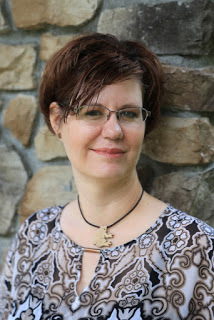 Molly Jo is a writer, editor, social media ninja, and producer of the weekly Firsts in Fiction podcast. She has been featured in children’s magazines, on blogs and devotional websites, and her short stories have earned her awards and scholarships from nationally acclaimed writing programs. She is the founder of New Inklings Press and author of
The Unemployment Cookbook: Ideas for Feeding Families One Meal at a Time,
and other books available through her website and on Amazon.Her current work in progress, NOLA, is a location mystery set in New Orleans and is scheduled for publication in late 2016.
Molly Jo is a writer, editor, social media ninja, and producer of the weekly Firsts in Fiction podcast. She has been featured in children’s magazines, on blogs and devotional websites, and her short stories have earned her awards and scholarships from nationally acclaimed writing programs. She is the founder of New Inklings Press and author of
The Unemployment Cookbook: Ideas for Feeding Families One Meal at a Time,
and other books available through her website and on Amazon.Her current work in progress, NOLA, is a location mystery set in New Orleans and is scheduled for publication in late 2016.
You can find her on Facebook, Twitter, Pinterest, and her blog, Frankly, My Dear . . .
 Ten Tips on Creating a Positive Social Media Buzz—To Be and Not to Be
Ten Tips on Creating a Positive Social Media Buzz—To Be and Not to Beby Molly Jo Realy @RealMojo68
Welcome to Social Media MoJo. I’m your social media ninja, navigating you through the cyber-world with all its twists, turns and rabbit holes.First up: Don’t Be That Person.You know who I’m talking about. There are certain cyber-people who make you want to use Facebook’s Unfriend button more often than not. Am I right? We’ve all been in that person’s skin one time or another. The thing is, you shouldn’t stay there.
Here’s a quick run down of five social media personalities you should try to avoid becoming:
 Avoid being the one who only wants to sell.1. The One Who Only Wants to Sell. You know these people. They ask “How are you?” but don’t wait for the response. They don’t care. While you’re telling them about your day, they’re just waiting for you to catch your breath so they can interrupt and suggest how your – or any – situation relates to their newest title. Everything they post turns back to the product they have to offer. It’s as though their only vocabulary is “Buy my book! Buy my book!” If this is your goal for using social media, I suggest you simply open an online store.
Avoid being the one who only wants to sell.1. The One Who Only Wants to Sell. You know these people. They ask “How are you?” but don’t wait for the response. They don’t care. While you’re telling them about your day, they’re just waiting for you to catch your breath so they can interrupt and suggest how your – or any – situation relates to their newest title. Everything they post turns back to the product they have to offer. It’s as though their only vocabulary is “Buy my book! Buy my book!” If this is your goal for using social media, I suggest you simply open an online store.2. The Self-Focused One. This is similar to No. 1 except these people know how to personalize everything – toward themselves. Instead of mandating that you purchase their wares, they manipulate every conversation back to “Me, Myself, and I.” They’re not really interested in hearing about your writing adventures. They’ll often interrupt the conversation to be the center of attention. Now, if you notice a fire behind the person you’re talking to, this is a good skill. If you’re trying to be a good friend, notsomuch.
3. The Silent Streamers. These are the people who see everything online but do nothing about it. Sure, having a new “like” on your page or a new follower on Twitter is equivalent to Internet cash, but only a penny or so. It’s the interactions that keep you going. Right? In the Internet world, if you’re not going to support someone, don’t offer your likes and follows and then disappear. That’s like being the child in room who covers their eyes and says “You can’t see me!” You really do know they’re there, but they want to pretend they’re not. What’s the point?
4. The Streaming Stalker. Similar to No. 3 except creepier. This is the person who gives a like to everything you do, on all platforms, the moment you do it. It’s like they wait online just for you. If you post a photo your donut-and-coffee breakfast, the Streaming Stalker will like it, suggest ways to eat and drink, and share it nine ways to Sunday. The Internet is designed for interacting, not creeping someone out. It’s okay to show your support, but don’t do it in a manner that resonates something off a crime drama. Let the person you’re following know you support them. Help promote them by liking, following, sharing, and commenting on their posts. Just not everything all at once. And don’t hijack their posts. Remember, you’re there to support them, not steal their thunder.
5. The Overly Emotional One. These are the people who are either happy-happy-happy, or woe-is-me. All. The. Time. Let’s face it. Life is full of a little bit of everything. It’s okay to be real online. Don’t be so cheerful that people want to put on blinders when they read your posts, but don’t be a chaos junkie either. We all have our up’s and down’s. So share bits and pieces of what’s going on in your world and by all means interact with your followers. But if you want more likes, the trick is to be likeable. Find a balance between Pollyanna and Eeyore and you’ll do just fine.
And now: The Buzzing Be’s.
Here’s a short list of social media behaviors that can help draw people into your hive and create some positive buzz for your and your books.
1. Use your (key) words. Ask yourself: Who will my audience be? When you post online, direct some of the conversation to their attention. Writing a cookbook? Use #recipe. Quote a sentence or two from your manuscripts or reference a character trait. Your hive will fly to your side and bring friends with them.
 Connection is a two-way conduit.2. Connection is a two-way conduit. The Three R’s: Reach, Respond, Reply. Whether it’s a like, share, or comment, your swarm is more likely to help create a buzz if they know they’re appreciated. Keep the honey flowing.
Connection is a two-way conduit.2. Connection is a two-way conduit. The Three R’s: Reach, Respond, Reply. Whether it’s a like, share, or comment, your swarm is more likely to help create a buzz if they know they’re appreciated. Keep the honey flowing. 3. Forget you’re a writer who needs readers. You are also a person, pet owner, coffee drinker, snowboarder, checkers champion. Whatever other things that go into making you you, don’t forget that your readers are also multifaceted. An honest online relationship is more than just marketing. Share those bits and bites of your life, and the next time one of your bees posts about their day, simply support them. They’ll think of you sweetly.
4. Share the sweet struggles. Writing isn’t always easy. Take your swarm on the journey with you. It’s okay to admit writer’s block or a belligerent character. Those behind-the-scenes moments are the extras readers like to experience with you. Just make sure you put your stinger away when venting.
5. Share the sweetness. Writing is a beautiful adventure. Give your swarm a reason to spread the buzz and share the honey. Offer freebies and discounts on your books. Swarm Swag like bookmarks and free downloads are terrific gifts to say thanks to those hard worker bees who spread the word for you.
With some sweet tea and a big smile,~ Happy writing and keep on Buzzing.
Molly Jo
TWEETABLE10 Tips on Creating a Positive #SocialMedia Buzz - @RealMojo68 on @EdieMelson (Click to Tweet)
Don't be THAT person on #SocialMedia - thoughts from @RealMojo68 on @EdieMelson (Click to Tweet)
 Molly Jo is a writer, editor, social media ninja, and producer of the weekly Firsts in Fiction podcast. She has been featured in children’s magazines, on blogs and devotional websites, and her short stories have earned her awards and scholarships from nationally acclaimed writing programs. She is the founder of New Inklings Press and author of
The Unemployment Cookbook: Ideas for Feeding Families One Meal at a Time,
and other books available through her website and on Amazon.Her current work in progress, NOLA, is a location mystery set in New Orleans and is scheduled for publication in late 2016.
Molly Jo is a writer, editor, social media ninja, and producer of the weekly Firsts in Fiction podcast. She has been featured in children’s magazines, on blogs and devotional websites, and her short stories have earned her awards and scholarships from nationally acclaimed writing programs. She is the founder of New Inklings Press and author of
The Unemployment Cookbook: Ideas for Feeding Families One Meal at a Time,
and other books available through her website and on Amazon.Her current work in progress, NOLA, is a location mystery set in New Orleans and is scheduled for publication in late 2016.You can find her on Facebook, Twitter, Pinterest, and her blog, Frankly, My Dear . . .
Published on February 22, 2016 01:00



